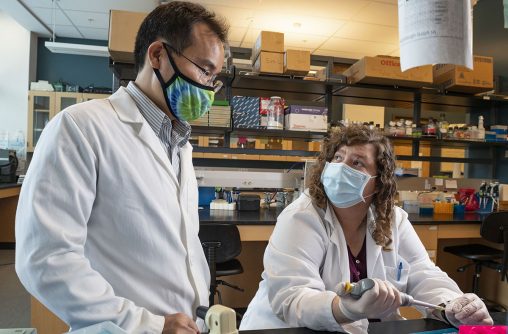
Weiwen Long, left, associate professor of biochemistry and molecular biology, and Marion Morel, a postdoctoral researcher, are studying non-small cell lung cancer.
A research effort aimed at developing new treatments for lung cancer is taking place in a Wright State University lab as part of a two-year, $200,000 grant from the American Lung Association.
Weiwen Long, Ph.D., associate professor of biochemistry and molecular biology, and Marion Morel, Ph.D., a postdoctoral researcher, are studying non-small cell lung cancer (NSCLC).
The American Cancer Society estimates there will be about 235,760 new cases of lung cancer in the United States this year and 131,880 deaths. NSCLC is the most common type of lung cancer, accounting for 84% of all lung cancer diagnoses.
In the pre-cancerous stage of NSCLC, cells undergo genetic changes that cause uncontrollable growth of abnormal cells. Further genetic alterations may lead to changes that cause the cancer cells grow and form a tumor.
The researchers are focusing on lung adenocarcinoma (LUAD, a major subtype of NSCLC) expressing KRAS mutants, which may cause cancer cells to grow and spread. However, no drug is currently available to effectively treat this type of lung cancer. Hence, there is an unmet need to identify new therapeutic targets.
Morel has identified a protein called FBXL16 that can regulate KRAS mutants and promote lung adenocarcinoma growth and drug resistance.
Long, who earned his Ph.D. at Tulane University and did postdoctoral work at the Baylor College of Medicine, said that if the sensitivity of cancer cells to drugs can be enhanced, physicians may be able to stop the growth of tumors or even eliminate them by combining drugs with inhibitor targeting FBXL16.
Working in the Diggs Laboratory, Long and Morel have conducted their research for three years, publishing some of their results in 2020. In August, they received the $200,000 grant ($100,000 per year and contingent upon renewal for the second year) to continue the research.
“The bottom line is we need to identify new drug targets and hopefully we can develop new therapeutics for treating this type of cancer,” Long said.

 Gov. DeWine reappoints Board Treasurer Beth Ferris and names student Ella Vaught to Wright State Board of Trustees
Gov. DeWine reappoints Board Treasurer Beth Ferris and names student Ella Vaught to Wright State Board of Trustees  Joe Gruenberg’s 40-Year support for Wright State celebrated with Honorary Alumnus Award
Joe Gruenberg’s 40-Year support for Wright State celebrated with Honorary Alumnus Award  Wright State’s elementary education program earns A+ rating for math teacher training
Wright State’s elementary education program earns A+ rating for math teacher training  Wright State’s Calamityville hosts its largest joint medical training operation
Wright State’s Calamityville hosts its largest joint medical training operation  Wright State University launches Strategic Plan 2030 to advance student success, enhance role as regional economic driver
Wright State University launches Strategic Plan 2030 to advance student success, enhance role as regional economic driver 